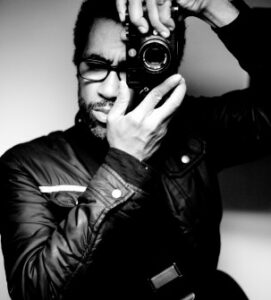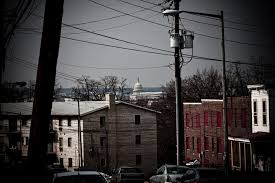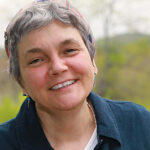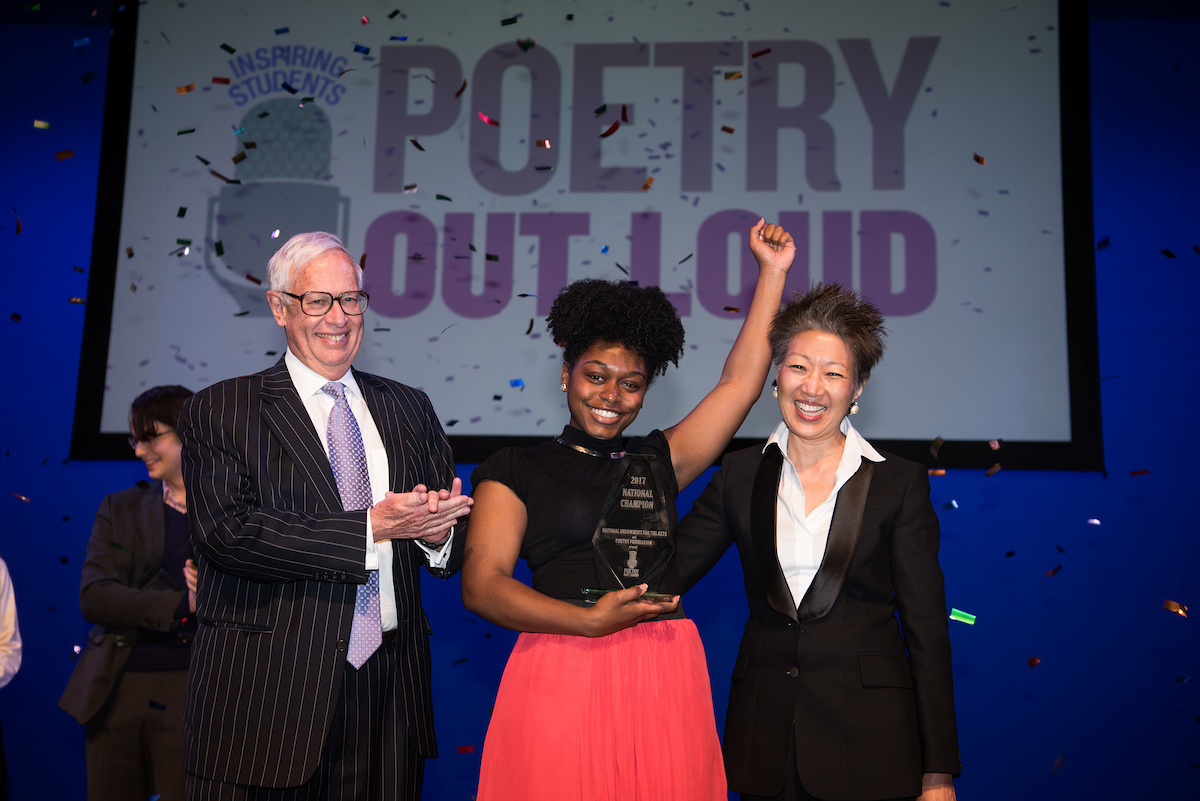In 2015, Bauhan Publishing released Sparks from the Anvil: the Smith College Poetry Interviews, a collection of interviews with superb contemporary poets by writer and teaching artist Christian McEwen. In this, the final excerpt from the book to appear in Teachers & Writers Magazine, McEwen talks with Thomas Sayers Ellis.
Thomas Sayers Ellis’ first, full-length collection, The Maverick Room (Graywolf Press, 2005), received a Mrs. Giles Whiting Writers’ Award and the 2006 John C. Zacharis First Book Award. His 2010 collection from Graywolf, Skin, Inc.: Identity Repair Poems, includes his own photographs. He is also the author of The Good Junk (Take Three #) (Graywolf, 1996); The Genuine Negro Hero (Kent State University Press, 2001); and Song On (WinteRed Press, 2005). Ellis’ Breakfast and Black Fist: Notes for Black Poets is forthcoming from the University of Michigan Press Poets on Poetry Series. Ellis co-founded The Dark Room Collective in Cambridge, Massachusetts in 1988 and earned a MFA from Brown University in 1995. In 2015, he was awarded a Guggenheim fellowship for poetry. Ellis is an assistant professor of creative writing at Sarah Lawrence College.
Christian McEwen: Would you begin by talking a little bit about your growing up? I was so moved by the piece that you wrote about your father, the piece called “Sticks.” And I wondered if that was directly autobiographical.

Thomas Sayers Ellis: It’s directly autobiographical in the way that memory is selective and frames an experience. Certainly everything in “Sticks” is based on a truth as remembered by an adult who has had craft, the craft of poetry, the craft of the strict line-breaking—what William Stafford calls “the breathing walk”—enacted upon the practice. I was a skinny kid with a rather large father who was really into sports and the physical world. I wanted to be a football player all my young days. And mostly I spent my time drawing and making language.
CM: In those days, kindness and small size were seen as sissy.
TSE: Yeah. Certainly in the community I grew up in, which, for the most part, is an inner-city, black neighborhood. My dad was a boxer. He drove cars. He was a huge physical presence. And he was what we called in the neighborhood a “soul man.” I mean, he was one of those people whose aesthetic, his nuance, was an aesthetic of the tradition of James Brown and men like that. So sissified, because everything in those neighborhoods is about survival. So every opportunity, everything about your being, is gauged in terms of the possibility of survival, which leaves out aspects of the intellect in certain cases.
CM: What was your relationship to poetry as a child? I was also moved by the poem “Nicknames.” Were you indeed known as “Sayers” and “Sticks”?
TSE: I only learned to make poems autobiographically. So I was definitely simultaneously known as “Sayers” and “Sticks.” I was skinny; I played the drums; and on all the Little League football teams, I was called “Sayers,” so it became my nickname and it eventually took the place of my given middle name. “Sayers” is the great Chicago Bears running back, Gale Sayers, who is the most poetic runner in the history of pro football.
I do believe that Mr. Sayers’ gait, his style, is akin to— or was one of the early things I wanted to get—in the prosody, in the prose and the song. But I was in love with noise. Noise, sound—whatever the sound was— the sound of something scurrying across the floor, the sound of something falling against the glass, the noise in movies. I like sounds and I’m very interested in how they struggle to become language and words. I’m not in love with storytelling, you know. I need aspects of storytelling, aspects of fiction and things like that in the toolbox. But I’m mostly in love with the struggle that sound makes to become meaning, shape, idea.
CM: I loved how you said that: “Sound struggling to become.” What poems were you reading that helped you see that that could happen?
TSE: I wish I could recover and remember that. My great-grandmother was a Baptist preacher. So the Bible was there. My dad would bring records home and he would quiz me on lyrics, and who played in the band, and what the songs meant, and things like that. It created an interesting exchange and an interesting hunger or aim in me. And I know that I must have come in contact with books, but I don’t remember anything that was important to me. If I saw the newspaper, I grabbed it. If I saw a poster or sign, I read. So there wasn’t a book in school that was, “Oh, I remember I loved that book.” I often even want to forget the authors and remember the styles.
CM: And as you grew older, did your friends from the world of literature kind of gather around you in the sense that you were influenced by Whitman or whomever?
TSE: There’s no doubt about it. The first poem that I probably loved when I came in contact with a little pre-formal training was “The Love Song of J. Alfred Prufrock.” That poem meant so much to me simply because of the way it was shaped. Because of the kind of opposition. I loved the control and the stepping out of the control and the stepping back into control. And just that it wasn’t same stanza, same stanza. Susan Sontag once said, “Writers are people who are interested in everything.” And a poet is certainly part designer, part architect, part feeler, part thinker. And I just loved the design of Prufrock in addition to all the “Let us go then, you and I/ When the evening is spread out against the sky/ Like a patient etherized upon a table.” The organic wholeness of it just spoke to me.
CM: Indeed. I’m going back now in my mind to you as an artist, somebody who loved to draw, and also as somebody who wears glasses, and I imagine has done so for quite a while. How old were you when you got your glasses?
TSE: I suspected the need at about ten or so, and I got my glasses.
CM: And did that make life easier, or was it one of the things you were teased for?
TSE: I was teased for it, but not in a terrible way. It’s interesting today—glasses are rare. I used to think it was a cool style thing. You know, I fell in love with cinema before college, but heavily in college. I loved the way certain filmmakers and certain leading men wore glasses. So I always thought it was cool—especially the Italians. The Fellini gang. You know, even Godard and his cool glasses. So, I don’t know. I didn’t get teased so much, but I think it added an extra mile to my farsightedness.
CM: At what age did you begin to think of yourself as a poet?
TSE: Tomorrow. The birthday that hasn’t come.
No, I think I committed to or realized there was poetic sensibility. You know, I felt things. I felt things all the time. And I wanted to shape and say things about the things I felt all the time. And I recognized that early on, even as a kid. I was given the gift of thinking that was poetic whether it was or not. That’s probably guided my work in a certain direction. So I wrote poems pretty early. Things about birds. I remember even imitating what John Lennon and Paul McCartney used to do. I remember falling in love with the song “Blackbird” and thinking that poem must be written in couplets. I’m gonna write it and then I’m going to imitate it. Little things like that. The easy things to do before you learn the heavy people. So I was writing poems or song-like poems about birds and animals and trees and towers and, you know, churches. Things that I thought would always be here and were always here. And that’s pretty early. That’s while I’m reading comic books at eleven and twelve and thirteen. I’m playing with words. It’s because I was a shy child. It’s easy to be loud and open on the page.
CM: That’s a lovely way of saying it. So was anyone reading those poems about the birds and churches and the towers?
TSE: Those poems were being hidden from my large father. He didn’t say, “I don’t want to see your poems,” but I know he wanted me to draw and be a football player. I just thought that if he found the poems, he would know that I was reading a lot. And if he knew I was reading a lot, he would ask me… I came from a poor family and I was—I’m not ashamed to admit or not proud to admit it, but this was just the way it was. The books I got— had hidden under my bed— were books that I had stolen. I’d take walks and dream and wander into used bookstores and borrow books that I’d heard about. I met a woman at age fourteen or fifteen sitting across from me in Washington, DC Metro subway. And she had a big red book. And she had a bag and the bag said “The MacDowell Colony.” And I said, “What’s that place on your bag?” And she goes, “It’s an artists’ colony where writers go.” I said, “Wow, I want to go there one day.” But the big red book she was reading had a “C” on it. And it was the collected stories of John Cheever. And I ran right out and stole it. I’ll never forget that. It opened up this part of the country to me in lots of ways. And I thought it was a way to travel to a world that I knew I would see one day. So I thought I’d be a fiction writer at first.
CM: That’s a great story. The red bag. The red book.
TSE: The red book.
CM: Can you talk a little bit about the ways in which being African American has influenced your work?
TSE: Being an African American, I know that I’ve embraced the tradition of the home space that I was given. I feel like in a poem like “Slow Fade to Black” I’m setting up a foundation so that there can be a “Here’s the problem. And now let’s speak from the after-equal.” And it seemed like that poem would be a great place to do a bit of what I call the “repair work.”
CM: I was wondering nowadays whether you find yourself guided toward a poem primarily by its music and rhythm or by its subject matter.
TSE: I’m usually initially guided—if it’s just the poem on the page—by the visual shape of it, the structural integrity of it, so to speak. It has to convince me at my first sight as, “I’m a poem. You can trust me. Or I can reach you.” And then I go forward. Or I’m wanting a reading experience that’s not so linear. I am liable to stay around if the motion, if the tapestry, if the nuance is made with some movement. Now, we call that movement in this country, you know, rhythm. I don’t think of it that way. I think of it as the ideas and the sounds, or that the writer is free enough to add the sounds in equal amount as one would the logic, so that the logic is sort of doubling that occurs. And that I know that the person who’s handling me is also surrendered enough to not know exactly where it’s going—to not be so in control. He’s allowed the language to enact some of that control.
When I’m writing and that happens, that’s the reward. That’s the growth. And I like that in the reading experience. I want to feel some of the surrender. Some of the writer allowing the language to be a part of the turning, and breaking, and the breathing walk, and the line. So that’s a lot to ask for.
CM: I’m thinking again about the issue of manhood and strength. And what it is to find a strength different from one’s father’s strength. And going back to your poem “The Outlaws,” and wondering whether you yourself were part of George Clinton’s gang. And if so, how that played out.
TSE: I think that there’s no way to escape being your father’s son. Work against it all your life or embrace it all your life. Try to make peace with it or reach an understanding. The route I’ve taken is to first ask myself, “What is my craft? And how much of my father can be allowed into the craft?” It would come out somehow, you know. The trap is they make us. We don’t make them. And so in my way, in the percussive nature of my work, I’ve embraced it. I’ve come to terms with what it is and how aspects of it can be used in the gift, in the craft. Now George Clinton’s gang, “The Outlaws,” and Parliament-Funkadelic is an inheritance that comes to me via my father. I’m a part of them in the way that I’ve embraced the inheritance. I’ve found a place that I’m comfortable in that is neither, as we say in the streets, all up into or totally on the sideline. I’ve negotiated a compromise that poetry can handle because I belong to poetry now, in the way that the writing seems to be writing me.
CM: Poetry is your new gang in a sense.
TSE: Yes, totally. That’s great. That’s perfect.
CM: And the old gang or your brother, because your father is now dead, how do they respond to Thomas the Poet?
TSE: You don’t respond to Thomas the Poet. You tolerate and you probably tiptoe around and you say, “I heard you’re doing this. That’s cool.” There aren’t readers in that way in my family. But again, in the way that I’ve embraced the inheritance, I’ve tried to make work that is cognizant of that. And the allegiance says, “I don’t think that the poet has to choose an “–ism,” choose a moment of style from the tradition and only excavate there. I think we’re still very much at a primitive place by dividing the history into compartments and styles. And I’m just waiting for it to all come together and be normal. It’s not easy. But Thomas the Poet—I’m certainly the blue fish in the gray fish tank.
[Laughter.]
And it doesn’t feel bad. There were many before me and I’ve read about them.
CM: I wanted to ask you when you knew when something was done. There was an interview I think that Nikky Finney did with Lucille Clifton. And she talked about students who think that the first tingle is the end when, in fact, it’s only the beginning. So how do you teach yourself to stretch it further?
TSE: It’s not possible to know. You feel like you feel in a meal. The poem is swelling in you. And the poem is forgetting about you. The poem is finishing with you. You feel something in the back of the ear or under the brow itch, and you know it’s done. There’s this famous, famous thing where John Coltrane says to Miles Davis, “Miles, how do you know when a solo is over?” And Miles says, “You take the damn horn out your mouth.” There’s something in the object that tells you when to take the horn out your mouth.
Now, the history of shapes, the history of forms tells you there could be a commercial break. There can be a blink. There could be a long trip across the world and back. And if it still worries you, then it deserves another look. But ultimately the poem on the page is the only thing that can be finished. The work itself continues to go on and goes on in other poems. It’s never done. I think you develop a mechanism of feeling when it’s time to take your horn out of your mouth or vice versa. The poem does that for you. You negotiate that over time. It’s like doing push-ups. You know, you stop them. There’s no such thing as a bad one. It contributes to that muscular way of knowing that is really hard to articulate because it begins as impulse and ends as impulse if anything.
CM: Whose work do you find yourself admiring now? And what classic poets do you return to?
TSE: One of my favorite poets is the poet Muriel Rukeyser. I teach at Sarah Lawrence now. I particularly took that job because she used to work there years ago. When I got there, I said, “Where was her office?” And they can’t find it. So sad. But, I love Rukeyser. Those are hands I sought. I love my teachers because I studied with them to be near them. Seamus Heaney and Derek Walcott. Auden could do everything I think. I like lots of different things. I like Milosz. Oh, Milosz is so whole. I think about some of the Russian poets whose names I always screw up. Marina Tsvetaeva. I like a French cultural critic, philosopher, genre-bender, Hélène Cixous. I like the people that find lyricism in no matter what they’re doing. And they make the language speak to itself.
CM: I wondered if you had any advice for young writers just starting out. And also for those who are older and may be more discouraged.
TSE: You can be an old young poet and a young old poet. You don’t control the path. And when you make a mistake and can’t do a thing, you’ve usually stumbled upon something that you are comfortable doing. I have a poem in my first book, The Maverick Room, because I was so in love with Elizabeth Bishop’s “One Art.” “The art of losing isn’t hard to master.” A villanelle as they say, with variations on some of the refrains. I was trying to do that. I couldn’t get it right. And I chopped my lines in half and made my lines faster, and I came up with this poem called “Atomic Bride.” And I’m not saying it’s some great poem, but I’m saying that I found the thing in that poem that I do comfortably and passionately. That I believe in. It’s my own brand of repetition that I hope is similar to what Gertrude Stein calls “insistence.” Where I’m insisting and insisting and insisting. Sometimes in the same tone. Sometimes in a variant on that tone. So surrender to the accident. Recognize the accident. Even if you don’t champion it then, return to it and work it into, occasionally, a scheme. To what Robert Hayden calls “something patterned, wild, and free.”
For older people, I would say the same exact thing.
CM: When Nikky Finney interviewed Lucille Clifton, she said to her, “Think of a moment in your life so precious that if you could wear it, you would. A moment so divine.” And I realize it’s a kind of outrageous question. But if you had to answer that, what would you say?
TSE: Well, I’m a little sad that I don’t remember birth. I might be that poet who would want to remember birth. And it’s usually when it’s my birthday, I send my mother a birthday card because it seems to me more her birthday and her work day and her struggle day than mine. It always seems so silly. That seemed to me like I did nothing. The thing that I’m connected to that I don’t get to wear is my mother’s birth. I think that’s not my work. And I wish that were it.
CM: Well we’ve reached the end unless there’s anything you would like to add.
TSE: I feel lucky that all of this got out of me. I feel more—because of this exchange—more caught up in continuing than before I walked in this room. It just makes you remember what more there is, and where the holes are and how much more there is to do and to just try and try and try.
—December 2009
Smith College, Northampton, MA
Editor’s Note: This interview has been edited and condensed for space considerations and clarity.
Photo (top) Credit Jonah Koch
In this video, Thomas Sayers Ellis performs his poem, “Sticks.” Here Ellis is interviewed for Cave Canem and City of Asylum/Pittsburgh.
Christian McEwen is a freelance writer and workshop leader originally from the U.K. She is the author of several books, including World Enough & Time: On Creativity and Slowing Down, now in its eighth printing. She edited Jo’s Girls: Tomboy Tales of High Adventure; Sparks from the Anvil: the Smith College Poetry Interviews; and, with Mark Statman, The Alphabet of the Trees: A Guide to Nature Writing. Christian has enjoyed residencies at Yaddo, MacDowell, Mesa Refuge, and the Virginia Center for the Creative Arts, and has received a fellowship in playwriting from the Massachusetts Cultural Council. Her new book, In Praise of Listening, will be published in October.




